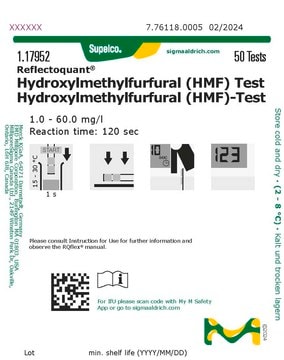W501808
5-(Hydroxyméthyl)furfural
≥99%, FG
Synonyme(s) :
5-Hydroxyméthyl-2-furaldéhyde, 5-(Hydroxyméthyl)furfural, 5-Hydroxyméthyl-2-furanecarboxaldéhyde, HMF
About This Item
Halal
Kosher
Produits recommandés
Source biologique
synthetic
Niveau de qualité
Qualité
FG
Halal
Kosher
Conformité réglementaire
EU Regulation 1334/2008 & 178/2002
FDA 21 CFR 110
Essai
≥99%
Indice de réfraction
n20/D 1.562 (lit.)
pb
114-116 °C/1 mmHg (lit.)
Pf
28-34 °C (lit.)
Densité
1.243 g/mL at 25 °C (lit.)
Application(s)
flavors and fragrances
Documentation
see Safety & Documentation for available documents
Allergène alimentaire
no known allergens
Propriétés organoleptiques
butter; caramel; fatty; musty; waxy
Température de stockage
2-8°C
Chaîne SMILES
[H]C(=O)c1ccc(CO)o1
InChI
1S/C6H6O3/c7-3-5-1-2-6(4-8)9-5/h1-3,8H,4H2
Clé InChI
NOEGNKMFWQHSLB-UHFFFAOYSA-N
Vous recherchez des produits similaires ? Visite Guide de comparaison des produits
Application
- Resultant compound from sublimation test for Gentianae Radix in Japanese Pharmacopoeia was 5-(hydroxymethyl)furfural.: This letter to the editor confirms the presence of 5-(Hydroxymethyl)furfural in traditional medicine preparations, discussing its implications for quality control and safety standards in pharmaceutical contexts (Tsuge et al., 2024).
Mention d'avertissement
Warning
Mentions de danger
Conseils de prudence
Classification des risques
Eye Irrit. 2 - Skin Irrit. 2
Code de la classe de stockage
11 - Combustible Solids
Classe de danger pour l'eau (WGK)
WGK 2
Point d'éclair (°F)
174.2 °F - closed cup
Point d'éclair (°C)
79 °C - closed cup
Équipement de protection individuelle
dust mask type N95 (US), Eyeshields, Gloves
Faites votre choix parmi les versions les plus récentes :
Déjà en possession de ce produit ?
Retrouvez la documentation relative aux produits que vous avez récemment achetés dans la Bibliothèque de documents.
Les clients ont également consulté
Notre équipe de scientifiques dispose d'une expérience dans tous les secteurs de la recherche, notamment en sciences de la vie, science des matériaux, synthèse chimique, chromatographie, analyse et dans de nombreux autres domaines..
Contacter notre Service technique







